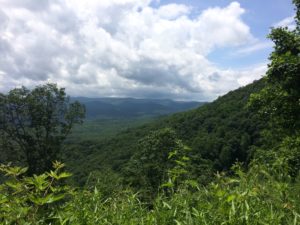By Guest Columnist MARY KATHRYN NAGLE, a lawyer, playwright and enrolled citizen of Cherokee Nation
When I think of Georgia, I think of home. Although I have never lived there, when I return, it feels like we never left.
As a little girl, my father used to take me and my sisters to Rome and New Echota, Georgia. We would drive for what seemed like an inordinate amount of time, from my childhood home in Joplin, Missouri to the homes of our great-great-grandparents, in what today is known as northern Georgia. And although we would complain about our captivity in the backseat, somewhere in forested hilly mountains of Tennessee the monotony of billboards, mile markers, and semis would give way to a tingling. A memory. A connection.
We were home.
The funny thing about home is that you can be told your home is not your home, politically. You can be told you no longer own it, financially. You can know that others live there, now. But when you return, your blood remembers. Your DNA does not forget.
In a way, I wrote my play Sovereignty in an effort to return home.

Mary Kathryn Nagle’s play, ‘Sovereignty,’ explores the motivation behind treaty by which the Cherokee Nation ceded land, and its ramifications on a lawyer today fighting for sovereign rights of Tribal Nations. Special: Mary Kathryn Nagle
I am a direct descendant of those who survived Andrew Jackson and his attempt to erase Tribal Nations. I am a citizen of the United States and of the Cherokee Nation – a Nation that as a result of forced removal, is now located in present-day Oklahoma, the home of 39 Tribal Nations.
180 years ago, my great-great-great-great grandfather served as Speaker of the Cherokee Nation Council that established the Cherokee Nation Supreme Court. We opened our Supreme Court in 1825 in New Echota, 20 years before the State of Georgia opened its own. We ratified our written Constitution in 1827, a document my grandfather helped write. We signed treaties with Nations around the world. And we exercised jurisdiction over Cherokee lands. If you committed a crime on Cherokee lands, Cherokee Nation would prosecute you – regardless of your race or citizenship.
But then, in the 1830s, Andrew Jackson rose to the pinnacle of power based on a platform that included the eradication of my people and my Nation. Some of the people that voted for him were mean spirited. Some were bigoted. Some just wanted a better of life for their children, and Andrew Jackson promised it. But his promise – a promise of better economic times for white Americans – was premised on the destruction of my people.
In this mission, he had an ally. The Governor of Georgia: John Forsyth. Immediately after coming into power, Gov. Forsyth declared Cherokee Nation’s government “unlawful,” and he passed a law making it illegal for any non-Indian citizen to enter Cherokee Nation without first signing his allegiance to the governor. His target was a white missionary from Vermont, Samuel Worcester. Worcester refused to swear his allegiance to Forsyth, and so Forsyth ordered the Georgia Militia to invade Cherokee Nation and arrest Worcester.

The Cherokee Nation once encompassed portions of five southeastern states, including land now within the Chattahoochee National Forest. Credit: David Pendered
In response to this unlawful arrest, in 1832, my grandfathers worked with the Principal Chief of Cherokee Nation, John Ross, to fight back against Georgia’s unlawful encroachment on our lands and jurisdiction in the United States Supreme Court. Together, they hired former Attorney General, under John Adams, William Wirt, and argued that Georgia had no jurisdiction over Cherokee Nation lands. In Worcester v. Georgia, the Supreme Court made clear that the State of Georgia could not exercise jurisdiction over Cherokee lands because Cherokee Nation was the only sovereign with authority over Cherokee lands. In a nutshell, the Supreme Court had affirmed our inherent right to exist and exercise authority over our own lands; the Court had nullified the legal authority of any other sovereign attempting to remove us from our homes. Worcester v. Georgia was an epic victory for my grandfathers and our entire Nation. It was a victory for all Tribal Nations.
President Andrew Jackson, however, refused to enforce it. Instead of upholding the Supreme Court’s decision in Worcester, he encouraged the State of Georgia to distribute Cherokee lands and homes to Georgia citizens in a lottery, and he looked the other way as members of the Georgia Militia raped Cherokee women—a violent, central part of their strategy to remove us from our homes.
As a young girl, my father would take us to our great-great-great-great grandfather’s home, Major Ridge, in what is today known as Rome, Georgia. Major Ridge lost his home after Jackson refused to enforce Worcester, when Georgia unlawfully gave it away in a lottery to a white citizen of Georgia. Now, as an adult, I make this trip as often as I can.

A reading of Mary Kathryn Nagle’s play, ‘Sovereignty,’ is slated for November at Emory University. Special: Mary Kathryn Nagle
In just one month, we will present a reading of my play Sovereignty at Emory University, directed by Molly Smith (of Arena Stage). This is the very first time the play will be hosted by an institution located within Georgia. This is the first time the play will be shared within the State that, just over 180 years ago, sought to eradicate us.
It is an incredible opportunity to bring the story home, to the home of my grandfathers. To the home the fought to save. To the home that was unlawfully and violently taken away.
This Indigenous People’s Day, my hope is that my fellow Americans will remember. Polarization, hate, division – these are all tools President Jackson used to try to destroy my people. But we are still here. And I think the reason we are still here is to remind us all that the cost of repeating the past is high.
Note to readers: Mary Kathryn Nagle is a partner at Pipestem Law, where her practice in commercial litigation and tribal sovereignty includes in briefs filed in federal appellate courts and the U.S. Supreme Court.
"still" - Google News
October 12, 2020 at 03:55AM
https://ift.tt/3lzcjBC
Indigenous People’s Day in Georgia: We Are Still... - SaportaReport
"still" - Google News
https://ift.tt/35pEmfO
https://ift.tt/2YsogAP
Bagikan Berita Ini
















0 Response to "Indigenous People’s Day in Georgia: We Are Still... - SaportaReport"
Post a Comment